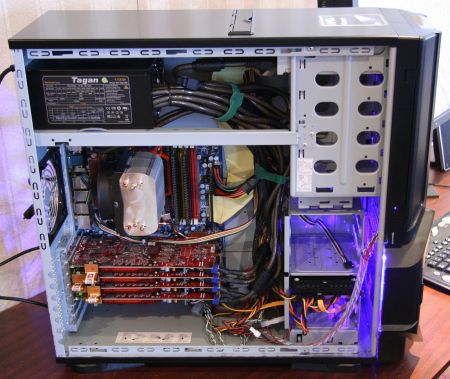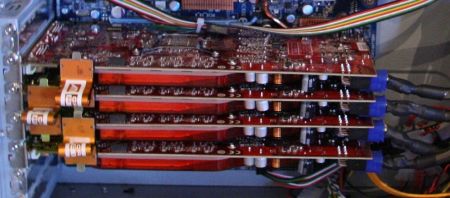AMD Radeon HD 3800: ATI Strikes Back
Triple And Quad CrossFire, Specifications
CrossFire Shifts To Third And Forth Gear... Well Soon
Whereas for NVIDIA, the quad-SLI failure was so overwhelming that it actually never existed (some new developments are coming soon...), AMD hence takes the opportunity to steal the Chameleon's thunder, if we can actually call it that, by introducing the possibility to group 2, but also 3 and 4 identical cards with its Radeon HD 3800. In reality, this is just an announcement however, since the drivers shouldn't truly be ready until next month at best, AMD itself talking about an actual maximal improvement of only x3.3 with 4 cards. The Global Illumination demo that we were able to see with the manufacturer was indeed working on such a machine with beta drivers and was clearly not stable.
Quad Crossfire, only at AMD
Note the absence of direct connection between cards 1 and 3, 2 and 4 and 1 and 4
This possibility will require another chipset, the AMD 790FX, which we'll go over in more detail after the Phenom launch. The next drivers should also introduce the Overdrive for Crossfire systems, meaning the ability to increase every card's clock at the same time.
Specifications
In the end, how does one explain this decline in number of transistors? Probably by the presence, in the R600, of disabled redundant units, meant to improve yields, considering the size and process of the chip. It's also probable that certain features appearing with the RV670 were already present on the R600, but disabled because of bugs.
Get Tom's Hardware's best news and in-depth reviews, straight to your inbox.
| Mains cards specification | |||
|---|---|---|---|
| GPU | HD 3850 | HD 3870 | 8800 GT |
| GPU's Clock | 670 MHz | 775 MHz | 600 MHz |
| Shaders' Clock | 670 MHz | 775 MHz | 1500 MHz |
| Memory's Clock | 833 MHz | 1125 MHz | 900 MHz |
| Width of the Memory Bus | 256 bits | 256 bits | 256 bits |
| Memory Type | GDDR3 | GDDR4 | GDDR3 |
| Memory Quantity | 256 Mo | 512 Mo | 512/256 Mo |
| Number of Pixels/Vertex Pipelines | (80) | (80) | (28) |
| Number of Texturing Units | 16 | 16 | 56 |
| Number of ROP | 16 | 16 | 16 |
| Throughput | 429 GFlops | 496 GFlops | 336 GFlops |
| Memory Bandwidth | 53.3 GB/s | 72 GB/s | 57.6 GB/s |
| Number of Transistors | 666 million | 666 million | 754 million |
| Process | 0.055µ | 0.055µ | 0.065µ |
| Die's surface | 196 mm² | 196 mm² | 324 mm² |
| Generation | 2007 | 2007 | 2007 |
| Supported Shader Model | 4.1 | 4.1 | 4.0 |
Good news in any case, using a 55 nm process enables AMD to own a chip that has a surface two times inferior than that of the R600, and more importantly, significantly smaller than the G92 by at least 41%. A real weapon in the oh-so-important price war fought between the market's two manufacturers, even if, once more, we need to take into account AMD's yields, which are probably worse at 55 nm than those of NVIDIA's G92.
Current page: Triple And Quad CrossFire, Specifications
Prev Page Radeon HD 3000: A New Architecture? Next Page Radeon HD 3850 And 3870
